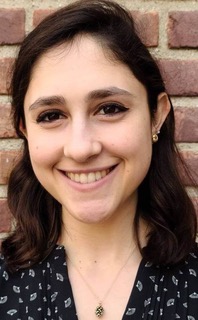
 back to all news
back to all news
SEAS Alumna Katie Barr (MS ’22) highlights the advantages of farm stops on local and regional food systems

Kathryn (Katie) Barr (MS ’22) graduated from the University of Michigan School for Environment and Sustainability (SEAS) in May 2022 with an MS in Behavior, Education and Communication (BEC). She is currently working at The Common Market, a wholesale regional food distributor, in the Mid-Atlantic region. She completed her SEAS master’s project about farm stops and how they can enhance local and regional food systems. We interviewed Barr to get a closer look at the process behind this project.
Barr defines farm stops as “year-round, everyday markets that support small-scale farmers and strengthen local and regional food systems by operating on consignment.” She surveyed the customer bases of four existing farm stops across the U.S. and conducted informal interviews of the farm stop managers and owners. Her research concluded that farm stops have a strong presence in the communities they serve, as they help community members feel like they are personally contributing to the development of a local food economy. They can also increase long-term resilience of communities by providing a reliable, year-round sales outlet for small, local producers and provide a sustainable source of food access to communities. Additionally, Barr worked closely with six other farm stops to add on to this research and created an accessible guidebook for anyone wanting to establish a farm stop in their community.

We asked Barr why she chose this master’s project and how she implemented it. Barr has an extensive background in organic farming, working in that market for six years before coming to U-M. Additionally, she also was interested in creating a more sustainable and resilient food system. After visiting Argus Farm Stop in Ann Arbor, she knew she wanted to spread the knowledge and benefits of farm stops to others. At the time, SEAS did not have a master’s project already developed that focused on localized food systems, so Barr created her own project with the help of SEAS Professor Raymond De Young. Barr said this can be a reminder to all SEAS students that if something they want to research is not already available, they shouldn't be afraid to reach out and create their own discipline.
Barr’s research demonstrates that communities should support local businesses such as farm stops, as they can be a more sustainable alternative to industrial agriculture and increase community resilience. For example, she discovered that the average U.S. farmer only receives 16 cents for every dollar of their produce sold. In comparison, when selling their goods at farm stops or markets, farmers earn 70% to 80% of the retail price of their goods. Pressure from competition as well as environmental impacts of climate change have made it increasingly difficult for small farmers to sustain their livelihoods. As Barr points out, the COVID-19 pandemic revealed that our current food supply chains are very fragile and that more consumers want locally produced goods due to these supply chain issues.
In Ann Arbor, Barr recommends that you check out the Argus Farm Stop, with three locations on Liberty and Packard streets, which are open year-round. They also offer a monthly food subscription share box, as well as accept EBT (electronic benefits transfer) for low-income residents. The best advice Barr has for SEAS students is to stay curious and get involved. Farm stops may not always be the most affordable option, but even if students cannot get all of their groceries there, they can still experience it by going to community events, volunteering or studying in the cafe.
Check out Barr’s full master’s project, as well as her guide to creating your own community farm stop location.

